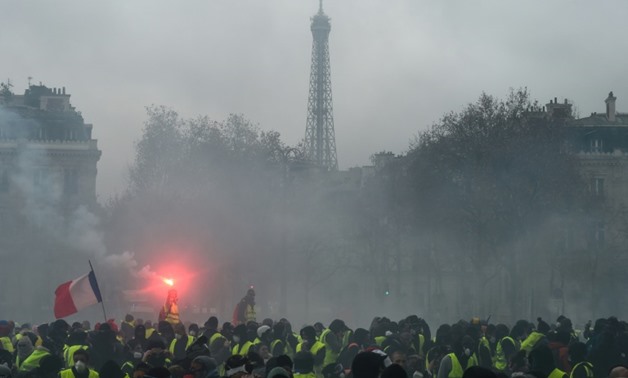
The so-called 'yellow vests' protests first erupted over Fuel tax hikes
PARIS - 5 December 2018: The French government on Tuesday backed down on planned fuel tax hikes in a bid to draw the heat out of fierce protests that have escalated into the deepest crisis of Emmanuel Macron's presidency.
The concessions, coming after an earlier 500-million-euro ($570 million) relief package for poorer households, mark the first time 40-year-old Macron has given ground in the face of public opposition.
Prime Minister Edouard Philippe announced rollbacks on fuel taxes and electricity price increases in a rare televised address after France was rocked by intense street clashes and vandalism in Paris over the weekend.
"This anger, you would have to be deaf and blind not to see it, nor hear it," Philippe said after more than a fortnight of demonstrations by so-called "yellow vest" protesters.
"No tax merits putting the unity of the nation in danger," he said.
Planned tax increases on petrol and diesel on January 1 will be suspended for six months, while hikes in regulated electricity and gas prices will be frozen during the winter.
Pressure has been mounting on the government after protests degenerated into the worst street clashes in central Paris in decades.
Across France, four people have been killed in accidents linked to the demonstrations and road blockades, and hundreds injured.
For weeks Macron held his ground on the fuel taxes, which are meant to finance anti-pollution policies but which critics say unfairly weigh on drivers in rural and small-town France.
Rescinding the January increase -- three euro cents for unleaded and six cents for diesel -- was a core demand of the demonstrators, alongside a higher minimum wage and the return of a wealth tax on high-earners which Macron abolished.
Two groups blockading petrol depots in Brittany said they would stand down following the announcement of the measures, which will cost public coffers some two billion euros ($2.3 billion).
Yet many others said they had no intention of stopping the demonstrations.
"They hope we'll now go home but we're not going to move," said Lionel Rambeaux, a 41-year-old welder manning a fuel depot blockade outside Le Mans in western France.
"We want Macron and his entire government to resign."
- Macron silent -
The government is hoping to stave off another day of running riots and burning cars like on Saturday, when more than 400 people were arrested in the capital.
Interior Minister Christophe Castaner said extra police would be deployed next Saturday on top of the 65,000 out in force last weekend, urging "reasonable" members of the movement to stay at home.
Paris Saint-Germain's home Ligue 1 football game against Montpellier has already been called off next Saturday, as has an electro music festival in the city centre.
Mass protests have repeatedly forced French presidents into U-turns, something Macron had vowed to avoid in his quest to "transform" the French economy and state.
A new poll by the Ifop-Fiducial survey group on Tuesday showed the former investment banker's approval rating at a record low of 23 percent.
"Eventually he backed down, which is going to divide the (yellow vest) movement, but it also risks dividing his own political base," said Jerome Sainte-Marie of the PollingVox survey group.
Macron's office said he would not speak publicly about the violence "for the time being", though he met briefly with a protester at his office Tuesday.
He also visited local government offices in the central town of Puy-en-Velay which were torched during a protest last weekend -- and was booed upon leaving.
- 'Original sin' -
The "yellow vest" movement, named after the high-visibility jackets worn by supporters, emerged on social media in October after months of swelling anger over rising fuel prices.
It quickly grew into wider protests against Macron, whom many accuse of representing a Parisian elite with little understanding of their monthly struggle to make ends meet.
Macron was elected in May 2017 on a pro-business platform that included measures inciting companies to invest to create jobs.
Immediately after coming to power, he pushed through tax cuts for entrepreneurs and high-earners -- an "original sin" for his critics.
The "yellow vest" protests have blocked highways and fuel depots around the country, causing headaches for businesses and fuel shortages in some regions.
The protests have spread to dozens of schools nationwide, which were still partially or totally blocked Tuesday by teenagers voicing frustration over university entrance reforms.

Comments
Leave a Comment